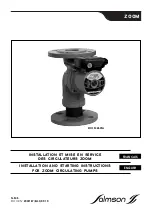
Safety instructions
11 Safety
instructions
11.1 Intended
application
Application area according to the directive 94/9/EG:
II --/2 GD 135°C (T4) –15°C
T
a
+ 60°C
The radial piston pumps may be applied only in conjunction with powders that ignition- and glowing
temperature is higher than 210°C. The radial piston pumps may be used as correcting elements for
volume flow control, pressure regulation and power control respectively in with hydraulic oil on mineral
oil base, oil in water emulsions (HFA, HFB), water glycol (HFC), synthetic ester (HFD), drill-emulsion,
isocyanides and polyol driven hydraulic systems.
The ambient temperature range for
HFA-, HFB-, HFC- und HFD-Fluid
is
0°C to +60°C
.
(Also see in the catalogue:
„Radial Piston Pump RKP-II For Low-Flammability Fluids HFA, HFB, HFC, HFD“
.)
Other or further application is not intended. The manufacturer/supplier is not liable for
damages as a result of this. The user takes the risk himself.
DANGER
The intended application also includes the observance of the User Manual and the
adherence to the inspection- and maintenance instructions.
11.2
Obligations for safe application
The radial piston pumps of the type series RKP19-II, RKP32-II, RKP45-II, RKP63-II, RKP80-II,
RKP100-II and RKP140-II may be driven only in conjunction with appropriate invigilators that avoid
that the pump runs dry and that air enters the pump circuit. This can be realized for instance by
monitoring the fluid level in the reservoir and the securing of the opened position of a possible, unique
valve in the supply line of the pump.
The assembly position of the pump has to be underneath the fluid level of the hydraulic power unit.
If this is not the case, then the user must ensure, by using appropriate safety measures, that before
and during operation the Radial Piston Pump is always filled with and only intakes operating medium.
The design of the safety measures must also take any foreseeable error conditions into consideration
i.e. it is impossible under any fault conditions that the Radial Piston Pump runs dry.
The end of the drain line and the end of the return line of the safety valve must be below the fluid level
in the reservoir. This has to be ensured by monitoring the fluid level.
The drive shaft of the radial piston pump has to be protected by an appropriate cover with a sufficient
resistance against mechanical stress through falling objects and suchlike.
All conductible parts of the radial piston pump have to be grounded with a bleeder resistance lower
than 10
6
Ω
compared to the earth.
The electric operating resources used in conjunction with the radial piston pumps of group II category
2 GD have to offer the same equipment class as the pump.
The radial piston pumps of group II category 2 GD may be used only in conjunction with gases,
vapours and hazes that comply with the explosion group II A, II B and II C.
11.3 Organisational
actions
We recommend integrating this User Manual into the maintenance schedule of the machinery. Follow
and instruct to the User Manual additional universal legal and other binding regulations for accident
prevention and environmental protection.
All safety instructions and warnings of the machinery manufacturer have to be followed.
The "Safety-related requirements to fluid-related machinery and component parts - Hydraulic” (EN
982) and „General regulations” (DIN EN 50014) are underlying.
Moog GmbH
Benutzerinformation RKP-II für explosionsgefährdete Bereiche (CA57626, Version 1.3, 12/09)
15










































